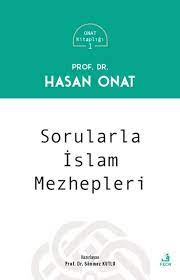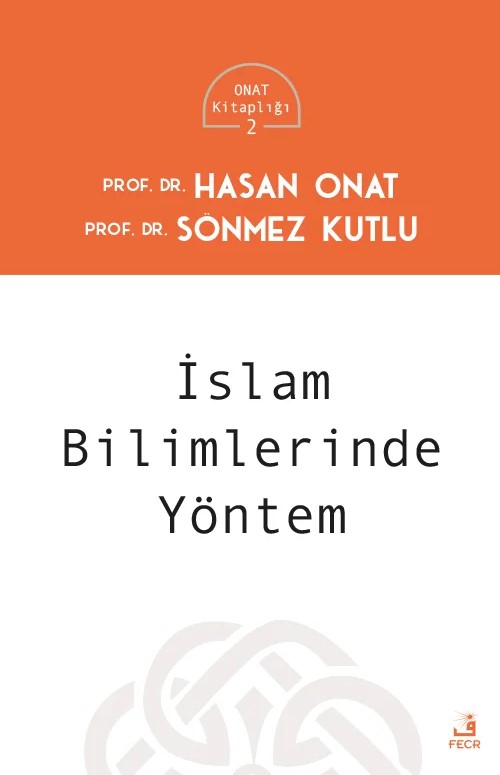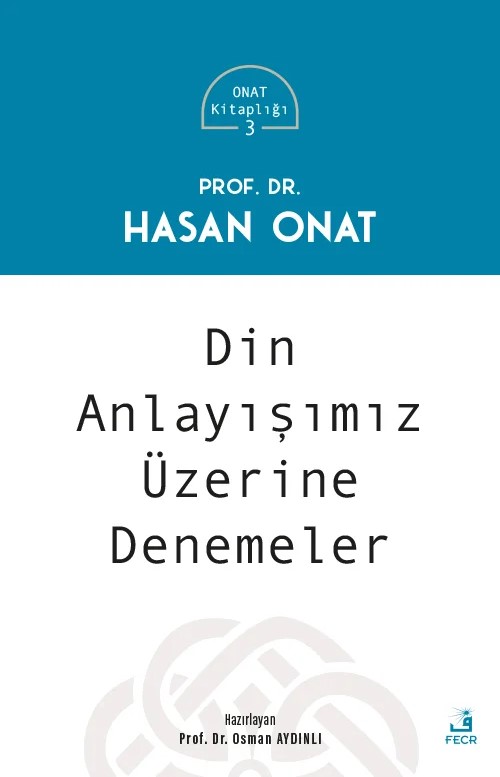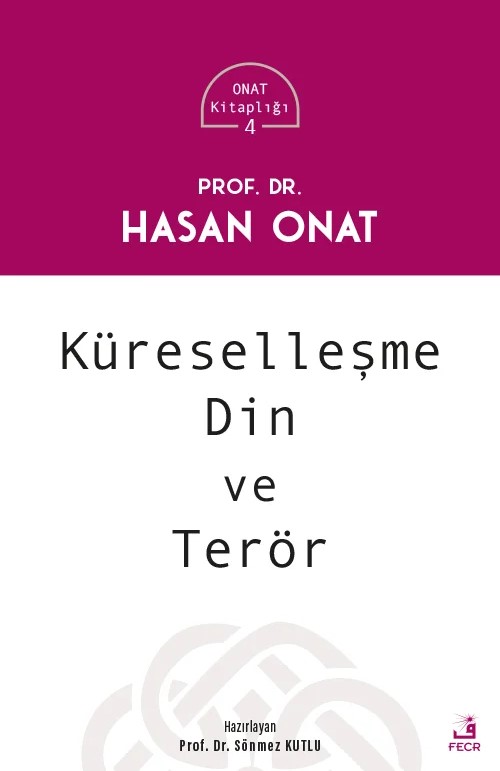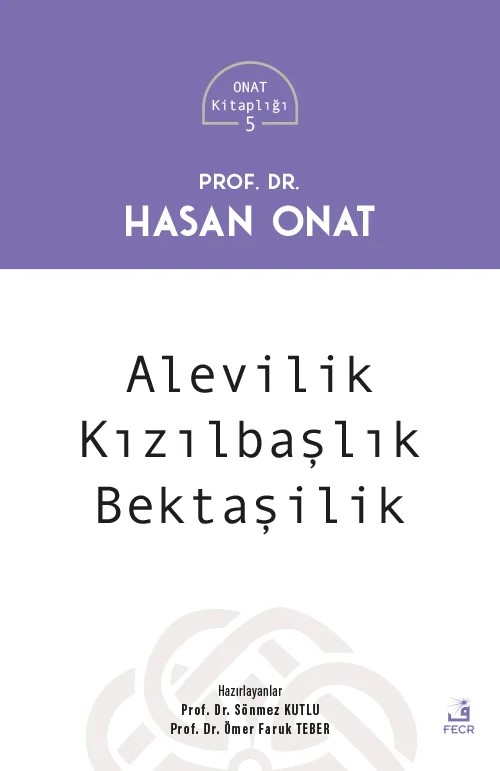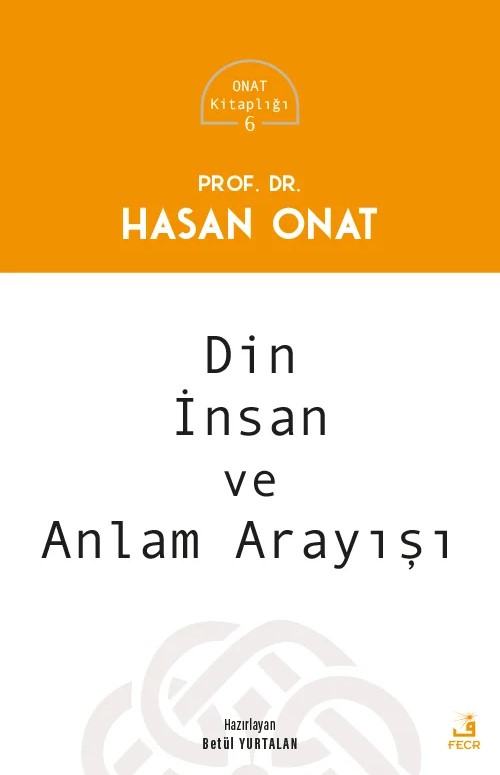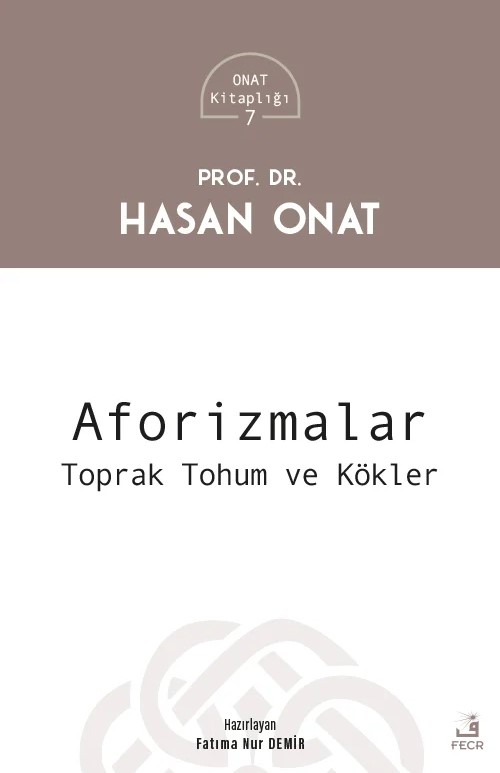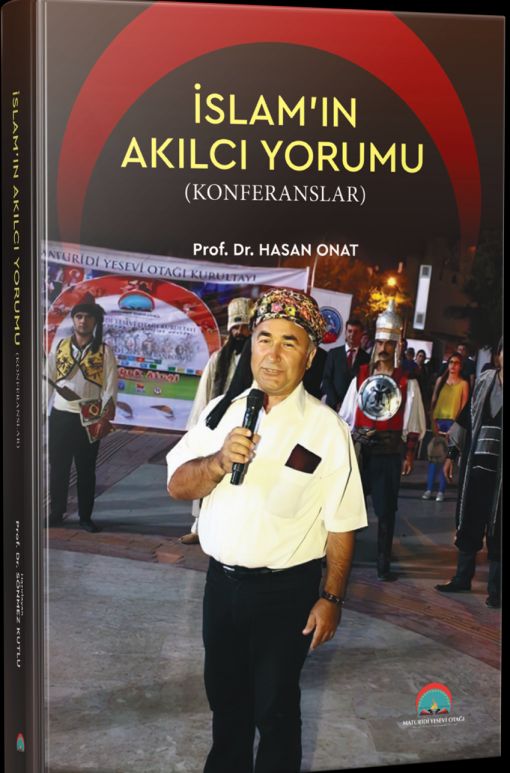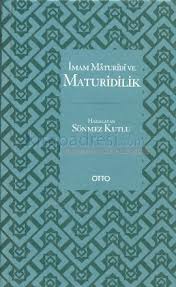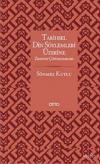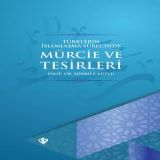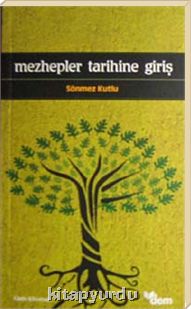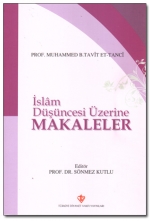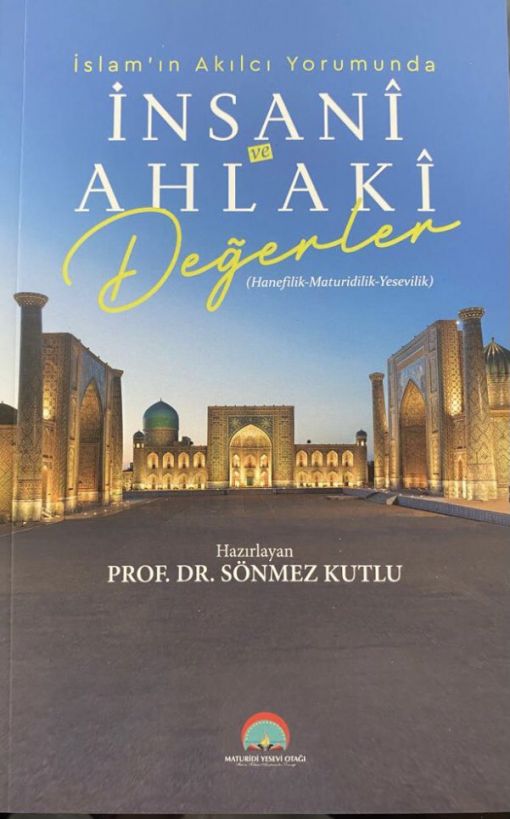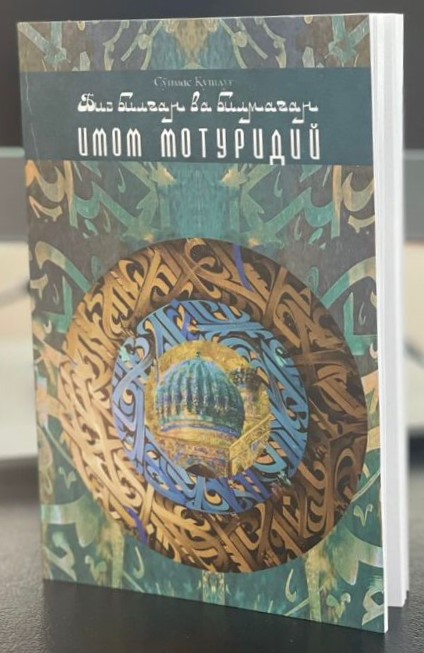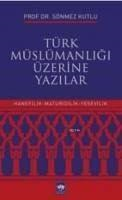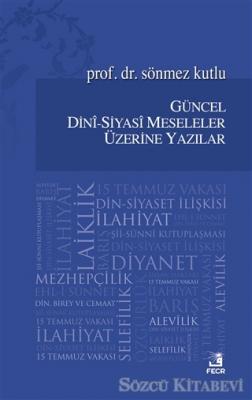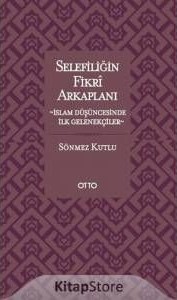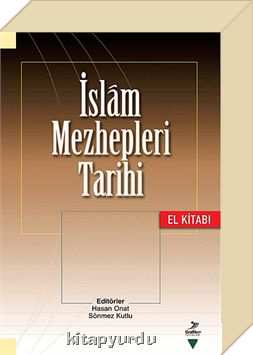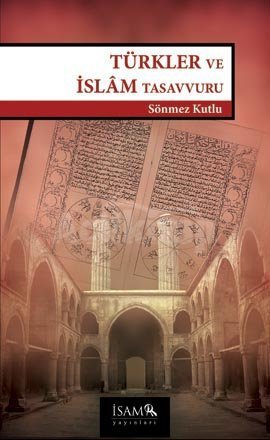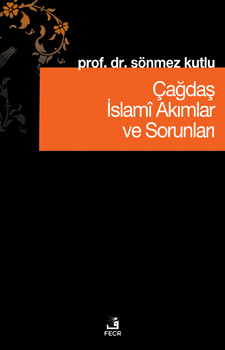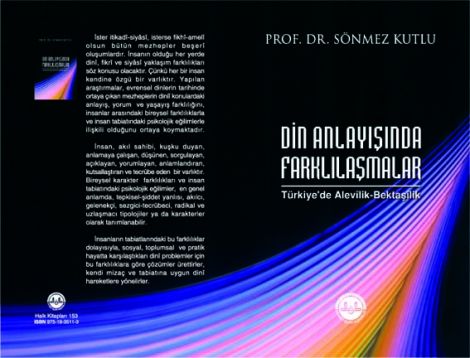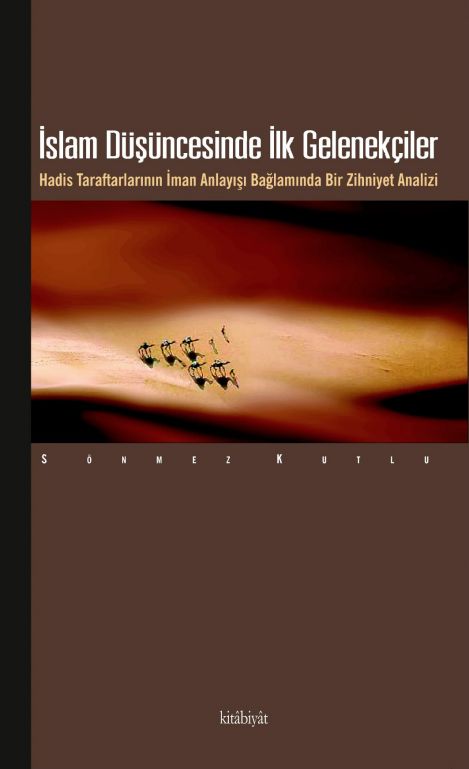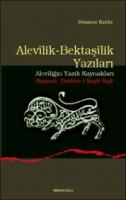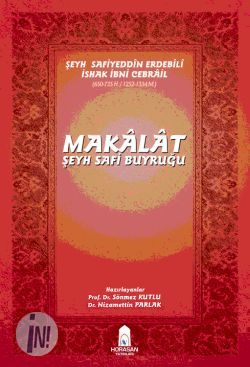Imam Maturidi and His Epistemology
İslam Kültür Merkezi Taşkent Sempozyumuna sunulan Tebliğ (2007)
IIMAM al-MATURİDİ and HIS EPISTEMOLOGY
Prof. Dr. Sönmez KUTLU
Ankara University, Faculty of Theology
1. Abû Mansûr al-Maturidî
1.1. His Time
Abu Mansûr al-Maturidî is the founder of the Maturdism which is a theological sect of Turkish clans. This sect is known as Maturidiyya. He was born in Maturid, a village in Samarqand city. His original name is Abû mansûr Muhammad b. Muhammad b. al-Mansûr. Although his precise birth date is unknown, his death date of 333/944 in Samarqand is almost certain. During his birth years, the Transoxiana region was under the sovreignty of Samanids who previously were semi-independent under Abbasid suzerainty, and later proclaimed the full independency. Many of the religious and political sects who were under the suppression in the western part of Abbasids such as Kharijite, Murjia, Mutazila, Zaydiyya and Ismailiyya had been striving to disseminate their views in this region where the central authority has weakened. However none of these sects had as many follovers as Hanafiyya in Fıqh, and Murjia in Belief that had been represented at the strongest level during the early times in this region. Especially the areas under Turkish domination, Hanafite became a national sect. Thereof the most effective schools in the cultural environment where al-Maturidi grew up were Murjia and Hanafite.
1.2. His Teachers
In Samarqand, there was an important educational centre called “Dar al-Juzjaniyya” where the philosophical and theological foundations of Abu Hanifa’s views on the creed and fiqh had been discussed. Abu Mansur al-Maturidi had received studies at this centre. He became head of this centre after his lecturer Abu Nasr al-Iyadî. The known lecturers of his are Abu Nasr Ahmad b. Abbas b. Husayn al-Iyadî (first part of IV. Century), Abu Bakr Ahmad b. Ishaq b. Salih al-Juzjanî (mid of the III. Centr.), Nusayr b. Yahya al-Balkhî (268/881) and Muhammad b. Muqatil al-Râzî (248/862). The scholarly tradition these scholars represented had based mainly on Abu Hanifa, and those who had place in this sequencial composed outstanding works. However most of the works of these scholars has not reached up to our time. The ones we have access are newly being discovered. One of these works is Ashr Masail min Asl al-Din of Abu Nasr al-Iyadî.
Although it is unknown whether Maturidi had travelled out of Samarqand, but if looked at the impact of the cities of Balkh and Nishabur on the scientific environment of Samarqand and being some of his lecturers native of these cities, it can be rightly assumed that he travelled these cities, if not, his lecturers might well be assumed that they went to Samarqand and lectured there. A perusal of his works elicits that he has a profound knowledge of other religious, jurisprudential and political sects and therefore he was not content solely with the surrounding of Samarqand. He was not content with his lecturers and their works. Therefore he found access to the texts and philosophical works of other religions and sects of his time. He examined them meticulously. He advocated in his works some of their views and criticized some of them. If looked at the quotations he cited, amongst the works he examined, the work of Logic of Aristotle is to be found.
1.3. His Disciples
As the lecturers of Abu Mansur al-Maturidi, also a few of his disciples is known. Amongst the known ones are Abu al-Qasım Ishaq b. Muhammad b. Ismail al-Hakim al-Samarqandî (340/951), Abu al-Hasan Ali b. Saîd al-Rustughfanî (345/956), Abu Ahmad b. Abi Nasr Ahmad b. Abbas al-Iyâdî and Abu Muhammad Abdulkarim b. Musa al-Pazdawî (390/1000). Of these only al-Samarqandî’s work of Sawad al-A’zam and another book on the faith (el-îmân) has been published together. The later scholars who became his indirect disciples through his works, had been as much effective as his early disciples in the formation and formulation of Maturidiyya and in developing of its views. The well known of these disciples are Pazdawî, Sâbûnî, Oshî, Abû al-Mu’în al-Nasafî, Umar al-Nasafî and Abu al- Barakât al-Nasafî. But many of their works are manuscripts in Istanbul Library awaiting to be edited. The distinguishec ones of them are Abu Ishaq al-Saffâr al-Bukhârî, Sadr al-Sharî’a, Gaznawî, Itqânî, Ubayd Allah al-Bukhârî and many more. The edited ones up to present are Abu Salama al-Samarqandî, Pazdawî, Umar al-Nasafî and Abu al-Muîn al-Nasafi who well understood and commented al-Maturidi’s theological views.
1.4. His Works
He left behind myriad books in the fields of Kalam, Fıqh, usul al-Fıqh, Sects and Qur’an Recitation. Nonetheless most of them have not been preserved, and lost due to invasions, emigrations, natural disasters, physical impossibilities and other reasons. Most of the extinct works are subsisting the criticism of Mutazila, Kharijite, Rafizite and Karmati-Shia, and the works on the Fıqh and Usul al-Fıqh. His works reached to us is the exegesis Ta’wilât al-Qur’ân which around 40 manuscripts of it are available, and the Kalam book of Kitâb al-Tawhîd which a sole manuscript of it is available on the earth. There is a thoroughgoing consistency between these two works in scholarly style, the method in approaching the subject matters and the views put forward and establishing their foundations. It is a probability that due to his exegesis of Ta’wilât contained his views on belief, fıqh and other religious doctrines is an impediment of reaching us his other works in multiple manuscripts. In Ta’wilât he was not content with the sole comment of the verses, but he employed the different views of the doctrinal and jurisprudential sects related to the topics and discussed them. Thereof the Ta’wilât is a main source in discovering Maturidi’s doctrinal and jurisprudential opinions. In fact his commentary of this, as looking at his use of frequent criticism to other sects in the comment of the verses, may well be deemed as a Theological Tafsir or a Sectary Tafsir. This book is being edited and prepared for the edition under the supervision of Bekir Topaloğlu in Turkey. Furthermore its two different critical edition has been made in Arabic world and has been published in Beirut in the years of 2006 and 2007. As Kitâb al-Tawhîd, at first time has been edited and published by an Arabic researcher Fathullah Hulaif. A second edition of this book has been consummated by Bekir Topaloğlu and Muhammad Aruchi and was published by Diyanet Vakfı (Turkish Religious Foundation) in 2003 at Ankara. Furthermore Bekir Topaloğlu has translated this book into Turkish by relying on this new edition. His both works reached us, explicitly states how respected faqih, mutakallim and mufassir he was amongst the scholars contemporaneous with him.
2. His Scholarly Side
2. 1. As a Hanafite Scholar in Fiqh and Usul al-Fıqh
Abu Hanifa had interested in both the matters of Belief (İ’tikâd) and Jurisprudence (Fıqh). Abu mansur al-Maturidi is one of very few scholars who managed to maintain the tradition of specilization in two fields of Belief (Usûl al-Dîn) and Jurisprudence (Furû’ al-Dîn) of Abu Hanifa School. Therefore the title of “Faqih” in the meaning of who knows the fields of fıqh and belief has been used for both scholars in the authoritative reference books. Hence the doctrinal views of Abu Mansur al-Maturidi and his lecturers and his disciples should not be traced in Kalam books, but at the same time they should be traced in the books resolving ad hoc problems titled as Nawâzil, Hawâdis, Fatâwâ, Hâvî fi al-Fatâwâ, Fiqh and Usûl al-Fiqh. Some black holes may well be illuminated by these works. Because some fıqh books beginning with usûl al-dîn or the views of these scholars on ad hoc matters in Kalam and Fiqh being placed under the heading of Fawâid. Majority of these works in the libraries of our country are awaiting to be discovered and published. Abu Mansur al-Maturidi not only undisputably accepted Abu Hanife as the painstaking leader in the subject matters of fiqh and belief but he explained his views hard to understand, supported them with newer proofs, and managed to formulate on this ground a rational-civilizational religious and mundane view. He is a personality who was both a disciple and a lecturer at the “Dar al-Juzjaniyya” the specilization centre of in Fıqh, Kalam, Tafsir and other fields. In Fiqh, He strived for reconstructing an Usûl al-Fıqh for the response of the necesseties of his time by revaluation of the culture of Hanafite Fıqh and Usûl al-Fıqh reached up to his time. Due to his works he wrote, he became the contemporary leader of the Hanafite Fıqh in Samarqand. However he was an adherent of Abu Hanifa school, it has no case be a reason for him to sacrifice the truth to the Hanafism. In some matters he had put forward contradicting views with Abu Hanifa, and new definitions and concepts. In this way he contributed to Hanafite tradition with a novel dimention. Nonetheless his successor scholars have failed to show the same success to sustain this development. Therefore by departing from the line of being rational and opinional, Hanafism became traditionalized like the other sects of jurisprudence.
2.2. His Theological Side
Abu Mansur al-Maturidi has more reputation and respect as a mutakallim than as a faqih and a mufassir. He is credited with the founder of a systematic Kalam School bearing his name as Maturidiyya. From his period onwards have been many scholars, most prominant ones are Abu Salama, Pazdawî, Abu’l-Muîn al-Nasafî, Ibn al-Humâm, followed and commented on his views and brought about so valuable works. When the Kitâb al-Tawhîd and Ta’wilât is examined, it is discernable that he discussed the significant problems which were previously not discussed by the mutakallims, and he employed unprecedented rational, transmissionary (naqlî) and semantic substantiations, and he enriched Kalam with a nature of science in the real sense of the meaning.
2.3. An Attempt of a New Hermeneutics in Tafsir
Abu Mansur al-Maturidi is a mufassir as much being as a faqih and a mutakallim. Qur’an has been interpreted throughout the history by many personalities. For some of these has made their interprations in general mostly by narrative (riwâya), this interprative tradition is named Tafsîr Riwâya. For some of them made their interpration mostly with rational comments, this type of tradition of commentary is called Tafsîr Dirâya. When Maturidi is evaluated from the point of these two traditions, he is deemed to be one of the earliest forerunners of the rational tafsir tradition. At the outset of his Ta’wilât al-Qur’ân, by making technical distinction between tafsîr and ta’wîl –if not this statement has been supplemented- he burdened to these two concepts the unprecedented meaning. According to him tafsîr is the expression of a decisive opinion about the purpose of Allah. However ta’wîl is preferring only one of the probabilities without expression a certain verdict about the purpose of Allah. He confined the first for the Companions (Sahâba), and the latter is for the faqihs of later generations. He considered these ta’wils as binding only to their doers, and he did not sanctify them. In order to make a place for ta’wîl, he took the hadith of “Whosoever says anything with his opinion about the Qur’an, he should get prepared for his abode in the fire,” as “Whosoever interpretes the Qur’an with his opinion, he should get prepared for his abode in the fire.” By doing so he asserted that it is not allowed to make tafsîr with the opinion, but to make ta’wîl is allowed. We assume that he make such dinstinction by the influence of Abu Hanifa’s views on ta’wîl. According to Abu Hanifa, the tanzîl and the ta’wîl of some verses are the same. That is the meaning of the verse is clear, no matter how much ta’wîl is employed, the same meaning is obtained; some of the verses’ tanzîl and ta’wîl is different. The verse has a meaning besides the literal meaning, it is possible to extract this meaning by ta’wîl. In this case, the ta’wîl and the tanzîl of the verse becomes different. The denial of the ta’wîl of a verse whose ta’wîl and tanzîl is different does not mean the denial of the verse. This perception grants the right to understand and interpret the Qur’an by using his Reason and employing a coherent methodology. However there is no room in the ta’wîl practised by some methods to make Allah as a witness and presenting his own views as Allah’s will. According to the standpoint of al-Maturidi, there is in ta’wîl a relativity not absoluteness. Judging by his recourse to linguistic analysis and rational and theological substantiations in the ta’wîl of the verses and by giving prominance to the relativity in the ta’wîl, we can rightly say that he is one of the personalities who opened a door to the epistemology and the hermeneutics in Islamic thought. Although he permitted more sphere of authority to reason and the opinion in his interpretation, he seldomly resorted to the hadith and the tafsîr of the Companions. However, Maturidi as seldomly employing hadith, in comparision with other exegetes in using ta’wîl to the verses, the hadiths employed as proofs he preferred the narrative as the meaning instead of transmitting the hadiths with their chains and phrases as they are. As far as understood from his Kitâb al-Tawhîd, if he is not satisfied about the soundness of the hadiths and narratives, though seldom, he employed as a precautionary and objectionary the phrase of “If its occurence is certain.”
3. His Epistemology
Maturidi is the forerunner of those who discussed the subject matters of utmost importance, such as the nature of the knowledge, the possibility of the knowledge, the means of attaining knowledge, how the knowledge comes about and the nature of the religious knowledge which are the main topics of the scientific disciplines of today such as the Sociology of the Knowledge, the Philosophy and Philosophy of Religion, and formulated a peculiar Epistemology in Islamic thought. Furthermore, based on this epistemology he wrote significant books on Kalam, Fiqh and Tafsir. The sources of Maturidi’s epistemology is composed of the senses, the narrative (haber) and Reason. As long as they comply with the necessary conditions, the knowledge attained by each of these three means or by the three means altogether is a certain knowledge and denial of them is impossible. There is a group of objects for each of these means of the knowledge. Sometimes the same group of objects can be a topic of two different sources of knowledge.
By the examination of his works, it seems that Maturidi has used the Qur’an in establishing of his epistemology. Because Maturidi, by analyzing the Qur’anic verse “Allah has extracted you from your mothers’ womb while you knew nothing, for you to be thankful He granted you ears, eyes and hearts.”, Maturidi explained the Qur’anic words of “eye” as the distinguisher of the colors from the patterns, the word of “ear” as the hearing the sounds and determining what they are, and the word of “hearts” as the instrument useful for identifying the things which are for and against a person but unnoticable by the eyes and ears. It appears by the given information and the expositions in the Kitâb al-Tawhîd that the seeing which is an instrument for obtaining the knowledge of the objects has been used as the equivalent of the senses, and the hearing is of the narrative, and heart is of the Reason, and the correctness of the knowledge related to the narrative is having based on the hearing sense which is one of the five senses. We would like briefly to deal with the senses, the narrative and Reason which are seen as the sources of the knowledge in Maturidi’s epistemology.
A) The Senses (‘Iyân)
Maturidi employes the words of ‘ıyân and the havâss for the equivalent of the senses. However, in meaning the havâss is narrower and the ‘ıyan is wider. As havâs is being used only for the equivalent of the five senses, the word of “’ıyân” has been used for the five senses and the intuition and insight. It also denotes the senses and the innate instincts of the animals. The human comprehension of the creatures and the objects comes into being through the five senses, namely the taste, the hearing, the seeing, the touch and the smelling. The human knowledge obtained through these senses is called as the sensory knowledge. However, the sensory knowledge is valid for the created objects and all the spritual objects occurred in our internal world. But their capacity of perception is limited. The sensory knowledge is correct if each of the senses is related to the sensory objects peculiar to its own and as long as the senses are sound. This knowledge is binding. Nothing is perceived by another sense. Because each one of these senses is created to perceive certain things peculiar to it. Maturidi enumarates amongst the peculiarity of the senses the world and the creatures in it, celestial bodies, created other physical creatures; taste, pleasure and lust; pain, astonishment; hunger and thirst, sounds and colors; motions of the objects and their silence and merger and dissociation and shape and image and so forth. Later Maturidites have employed the terminology of “Sound Senses” for the senses in order that the given knowledge be sound.
B) Narrative (Khabar)
According to Maturidi, narrative is a statement which has the possibility to contain a falsehood or a lie. Therefore a narrative given person should not falsify or attest it until it appears to be true or false in certainty. For the source of much of the knowledge of the people is the narrative, it is certain that it is a source of knowledge. For example, the source of the knowledge about the rule of the kings on the earth, the affairs they want to put in order, those who claims prophethood and wisdom, and the craftsmen is not the senses and Reason but the narrative. In addition, commandments and prohibitions, encourage-promise and threat (va’d, va’îd), permitted (mubâh) and prohibited and the like are deemed within the narrative. Every kind of narrative falls under “the narrative” as defined by al-Maturidi. It is evidently that, by the narrative which is the source of the certain knowledge he deliberated not only the Qur’an and the Sunna but also every true narrative presenting knowledge about the past or about anything.
Some researchers, face with hardship in manifestation of Maturidi’s original ideas on this matter because they deal with his viewpoint of narrative in general and hadith and sunna in particular, alongside with other Maturidites. It will bu more useful in the enlightment of this matter to examine his standpoint in approaching to the narrative and within it the hadith by using only his works instead of examining the Maturidites’ standpoint of hadith in general. In fact Maturidi appears to classify the narrative into three categories as an original idea and as being distinguished from the other scholars.
1) The Narrative of the Messenger (Khabar al-Rasûl)
After having put forward the Rational necessity of the narratives being as the source of the knowledge, Maturidi mentioned the necessity of the acceptance of the narrative brought by the Messenger from Allah. Because the narratives brought by the Messenger from Allah are true narratives (al-khabar al-sâdıq) and due to they have miracles approving their truthfulness, denial of their narratives is impossible. Consequently the truthfulness of the narratives they brought have been verified by Reason. Indeed, Maturidi mentioned that any narratives, its truthfulness and falsehood can be determined by Reason. Whoever denies such narrative, he denies it due to his pride and his obstinacy and his desire to make hardship. It is obvious that His intention from his explanations related to the narrative of the Messenger is the revelation/Qur’an. He deems the Qur’an as a rational miracle. Because when the Qur’an was conveyed to the people by the Messenger, he challenged the men of eloquence of the that time, and the wisemen and the poets, and none became successful in presenting its reminiscent. In this sense the Qur’an is a rational miracle and contained the true knowledge. Accordingly, to him, “any narrative is contrary to the rational proofs and the Qur’an must be rejected.”
2) The narrative from the Messenger (Khabar min al-Rasûl)
In fact, for any kind of narrative, however it is possible to make a distinction as ahad and mutawâtir, this classification is being made in the system of al-Maturidi for “the narratives from the Messenger.”
a) Mutawâtir Narratives
Maturidi developed a different definition of mutawâtir from his predicessor scholars and the traditionalists. His predicessors had defined the mutawâtir as the narratives made from the Messenger by the people of whom it is inconceivable that number of people would agree on a lie altogether. But Maturidi defined the mutawâtir narrative as the narratives reached to us from the Messenger narrated by the people who may both err and lie. Because they lack the document and the proof which determine the truthfullness and innocence as the Messenger have. If there is no probability of any sort for the untruthfullnes of the narrative, this narrative is just like narrative of the Messenger.
b) Ahad Narratives
Maturidi’s definition of ahad is; the narratives which lack the number of the narrators of the mutawâtir in transmitting the narrative from Muhammad, the Messenger of the mercy, in being binding knowledge, and impossible be witnessed in certainty. But to act in accordance with ahad narrative is needed with the stipulation of a thorough examination of the situations of the transmitters, to search its content and to compare it with a certain nass. After these procedures, it is accepted or not in accordance with the overwhelming situation. But in any case, the soundness of these narratives bears the doubt. Hence, the notion of that the ahad narratives does not constitute a certain knowledge and should not employed in the matters of belief, has been accepted by many mutakallim. Maturidi classifies the knowledge into two as the knowledge of practice (al-‘ilm al-‘amal) and the knowledge of witness (al-‘ilm al- shahada) and he advocates that ahad narratives bear the value of knowledge in the practical matters not in the matters of belief (i’tiqâdî).
3) General Narratives
The types of narratives may have room in this category are history, geography, genealogy, artifice, politics linguistics and the narratives giving news about other subjects. This type of true narratives are siginificant source of knowledge for people. The general narratives category may accomodate many subjects which we can obtain knowledge about them only through the narratives. The lineage of a person and his name, his character, the name of his abilities, the names of other species, the things which cause death or life, pharmacy, the goodnesses and the viles which the human reason may not comprehend by its own ; the human’s genus, category and types; medicine, languages, arts, wars and such matters and things. The people have always benefited from these type of knowledge and developed various sciences on this material.
C) Reason
Maturidi, in establishing the foundations of doctrinal subjects and in resolving the jurisprudential problems, frequently resorted to Reason and deduction (istidlâl) and examination (nazar), independent judgement (ijtihâd) and analogy (qıyâs). According to him one of the two main sources in learning the religion and in having access to attain religious knowledge is Reason, the other one is narrative (Sam’). Albeit he seems to relegate the sources of the religious knowledge to two, it is discernable in the section of “The means of obtaining knowledge” where he is analyzing this matter directly, he aroused the sources of the knowledge into three, by advocating that the reality of the incidents and objects can be learned through the perception/senses (‘iyân), the narrative and Reason (nazar). But in his works, there is no philosophical discussions as the ones retracable in later kalam works about the definition of Reason and its nature. Reason is defined mostly in accordance with its functions. According to this, Reason and nazar are an instrument distinguishing the useful from the harmful. In Maturidi’s epistemology, Reason is not only the source of religious knowledge at the same time, but also it is the source of the general knowledge and ethical knowledge too.
Maturidi regards Reason an essential criterion in verifying the knowledge produced by the other two sources and he establishes the foundation of his view as such: Three things necessitate the Reason and the reasoning. First is that it is necessery to reason in obtaining knowledge through the senses and the narrative. There is a need for reasoning because the the senses are insufficient in noticing the things that are far from the senses or the invisible objects due to minimality of their size. On the other hand, reasoning is needed for determining the narrative whether it is of the type of the one which bears the probability of being mistaken or not, and for distinguishing the miracles of the messengers from the magics of the magicians. Maturidi asserted that in order to extract the truth, in every matter, the reasoning and the thinking are necessary, in other words reasoning is necessery for distinguishing the miracles from non-miraculous behaviours. Allah, substantiated with this reasoning, the other things and the Qur’an which is determined with extraordinary proofs that It is from the side of Allah, and He ordered in many verses the use of Reason and to resort to rational substantiation. Second is that Maturidi asserted that reasoning and thinking are needed in finding out the truth in every field about the beauties and the ugliness of the objects, and about the goodness and badness of the actions of the people –even if the perception of the senses and the annunciation of the narratives is to be in question- and reaching the final knowledge in these matters is possible only with Reason. Thirdly is that knowing Allah and His commands is a matter of acquisiton and intention which can only be known with deduction.
Albeit Maturidi assigns a significant function to Reason, he accepts that, as the narrative and the senses are, its capacity to obtain knowledge and its range is limited. However, he relates the finiteness of Reason and its inability to know the objects with all its dimensions and everything with its details, by analyzing from onthologic standpoint, to being later created, touching it some defects or the matter it examined being so complex. Consequently, in these situations the perception of the goodnesses and the evils by the senses that the Reasons unable to comprehend, is possible only by the speech of “those who comprehend” and others’ listening with heeding. But this situation does not exclude Reason, totally, to be a source leading to a reliable and sound knowledge. Hence Maturidi accuses who rejects the reasoning of falling into paradox and doing vicious circle based on the reason that contravene Reason by resorting to Reason and for no available subject to be resorted to the deduction which is prohibited by the narrative and perception. Maturidi who sees Reason as a trust from Allah, says that, a person who is thinking and using his Reason, in any circumstance and subject, at the end he is to be benefited absolutely.
CONCLUSION
The significant novel contribution of Maturidi in Islamic thought in general and Kalam in particular is the Epistemology. There has been other precedent scholars who expressed different ideas about the definition of knowledge and its sources, but this topic has been made as an independent nature of Kalam by al-Maturidi, and it has been put amongst the prior topics of Kalam with the title of “The Sources of the Knowledge (Asbâb al-‘Ilm). He tried to apply this epistemology not only to Kalam but also to Fıqh and Tafsir and other fields. With his concept, alongside Reason and the Senses he inserted amongst the sources of the knowledge the True Narrative, that is, the Qur’an the Messenger conveyed to us as a revelation.
According to a common opinion, Mutazila is the sect that utilized Reason utmost in Islamic thought. But when Kitab al-Tawhid of al-Maturidi been examined, it will be understood that this opinion is not true. Because the stress made on Reason and rational substantiations in the ideas of Mutazila, we have had acces through the references of Mutazila or Heresiographical works written up until Maturidi and reached to us are so weak in comparison with what in Kitab al-Tawhid. Therefore it should not be false to announce Maturidi as one of the pioneers of “Theological Intellectuality” and his work as a “Classics of theological philosophy.” Therefore Maturidi, accepting “the Reason and the Religion as two important source of knowledge”, gave a great importance to Reason and deduction (istidlâl) in solving the problems of Kalam, and he says about reasoning: “The humanbeing is spearheaded in governing the creatures, and has been distinguished to resist to the hardships in this aim, and to research the intellectually useful things for them, to prefer the good and the beautiful things and to shun what is contrast to them.The means for knowing these matters is using the Reason by the examination of the objects and the events. There is no other method at all. Furthermore, in case of rising of the extraordinary circumstances and the suspisions, the refuge is only the thinking and the deduction.
Prof. Dr. Sönmez KUTLU
Ankara University, Faculty of Theology
1. Abû Mansûr al-Maturidî
1.1. His Time
Abu Mansûr al-Maturidî is the founder of the Maturdism which is a theological sect of Turkish clans. This sect is known as Maturidiyya. He was born in Maturid, a village in Samarqand city. His original name is Abû mansûr Muhammad b. Muhammad b. al-Mansûr. Although his precise birth date is unknown, his death date of 333/944 in Samarqand is almost certain. During his birth years, the Transoxiana region was under the sovreignty of Samanids who previously were semi-independent under Abbasid suzerainty, and later proclaimed the full independency. Many of the religious and political sects who were under the suppression in the western part of Abbasids such as Kharijite, Murjia, Mutazila, Zaydiyya and Ismailiyya had been striving to disseminate their views in this region where the central authority has weakened. However none of these sects had as many follovers as Hanafiyya in Fıqh, and Murjia in Belief that had been represented at the strongest level during the early times in this region. Especially the areas under Turkish domination, Hanafite became a national sect. Thereof the most effective schools in the cultural environment where al-Maturidi grew up were Murjia and Hanafite.
1.2. His Teachers
In Samarqand, there was an important educational centre called “Dar al-Juzjaniyya” where the philosophical and theological foundations of Abu Hanifa’s views on the creed and fiqh had been discussed. Abu Mansur al-Maturidi had received studies at this centre. He became head of this centre after his lecturer Abu Nasr al-Iyadî. The known lecturers of his are Abu Nasr Ahmad b. Abbas b. Husayn al-Iyadî (first part of IV. Century), Abu Bakr Ahmad b. Ishaq b. Salih al-Juzjanî (mid of the III. Centr.), Nusayr b. Yahya al-Balkhî (268/881) and Muhammad b. Muqatil al-Râzî (248/862). The scholarly tradition these scholars represented had based mainly on Abu Hanifa, and those who had place in this sequencial composed outstanding works. However most of the works of these scholars has not reached up to our time. The ones we have access are newly being discovered. One of these works is Ashr Masail min Asl al-Din of Abu Nasr al-Iyadî.
Although it is unknown whether Maturidi had travelled out of Samarqand, but if looked at the impact of the cities of Balkh and Nishabur on the scientific environment of Samarqand and being some of his lecturers native of these cities, it can be rightly assumed that he travelled these cities, if not, his lecturers might well be assumed that they went to Samarqand and lectured there. A perusal of his works elicits that he has a profound knowledge of other religious, jurisprudential and political sects and therefore he was not content solely with the surrounding of Samarqand. He was not content with his lecturers and their works. Therefore he found access to the texts and philosophical works of other religions and sects of his time. He examined them meticulously. He advocated in his works some of their views and criticized some of them. If looked at the quotations he cited, amongst the works he examined, the work of Logic of Aristotle is to be found.
1.3. His Disciples
As the lecturers of Abu Mansur al-Maturidi, also a few of his disciples is known. Amongst the known ones are Abu al-Qasım Ishaq b. Muhammad b. Ismail al-Hakim al-Samarqandî (340/951), Abu al-Hasan Ali b. Saîd al-Rustughfanî (345/956), Abu Ahmad b. Abi Nasr Ahmad b. Abbas al-Iyâdî and Abu Muhammad Abdulkarim b. Musa al-Pazdawî (390/1000). Of these only al-Samarqandî’s work of Sawad al-A’zam and another book on the faith (el-îmân) has been published together. The later scholars who became his indirect disciples through his works, had been as much effective as his early disciples in the formation and formulation of Maturidiyya and in developing of its views. The well known of these disciples are Pazdawî, Sâbûnî, Oshî, Abû al-Mu’în al-Nasafî, Umar al-Nasafî and Abu al- Barakât al-Nasafî. But many of their works are manuscripts in Istanbul Library awaiting to be edited. The distinguishec ones of them are Abu Ishaq al-Saffâr al-Bukhârî, Sadr al-Sharî’a, Gaznawî, Itqânî, Ubayd Allah al-Bukhârî and many more. The edited ones up to present are Abu Salama al-Samarqandî, Pazdawî, Umar al-Nasafî and Abu al-Muîn al-Nasafi who well understood and commented al-Maturidi’s theological views.
1.4. His Works
He left behind myriad books in the fields of Kalam, Fıqh, usul al-Fıqh, Sects and Qur’an Recitation. Nonetheless most of them have not been preserved, and lost due to invasions, emigrations, natural disasters, physical impossibilities and other reasons. Most of the extinct works are subsisting the criticism of Mutazila, Kharijite, Rafizite and Karmati-Shia, and the works on the Fıqh and Usul al-Fıqh. His works reached to us is the exegesis Ta’wilât al-Qur’ân which around 40 manuscripts of it are available, and the Kalam book of Kitâb al-Tawhîd which a sole manuscript of it is available on the earth. There is a thoroughgoing consistency between these two works in scholarly style, the method in approaching the subject matters and the views put forward and establishing their foundations. It is a probability that due to his exegesis of Ta’wilât contained his views on belief, fıqh and other religious doctrines is an impediment of reaching us his other works in multiple manuscripts. In Ta’wilât he was not content with the sole comment of the verses, but he employed the different views of the doctrinal and jurisprudential sects related to the topics and discussed them. Thereof the Ta’wilât is a main source in discovering Maturidi’s doctrinal and jurisprudential opinions. In fact his commentary of this, as looking at his use of frequent criticism to other sects in the comment of the verses, may well be deemed as a Theological Tafsir or a Sectary Tafsir. This book is being edited and prepared for the edition under the supervision of Bekir Topaloğlu in Turkey. Furthermore its two different critical edition has been made in Arabic world and has been published in Beirut in the years of 2006 and 2007. As Kitâb al-Tawhîd, at first time has been edited and published by an Arabic researcher Fathullah Hulaif. A second edition of this book has been consummated by Bekir Topaloğlu and Muhammad Aruchi and was published by Diyanet Vakfı (Turkish Religious Foundation) in 2003 at Ankara. Furthermore Bekir Topaloğlu has translated this book into Turkish by relying on this new edition. His both works reached us, explicitly states how respected faqih, mutakallim and mufassir he was amongst the scholars contemporaneous with him.
2. His Scholarly Side
2. 1. As a Hanafite Scholar in Fiqh and Usul al-Fıqh
Abu Hanifa had interested in both the matters of Belief (İ’tikâd) and Jurisprudence (Fıqh). Abu mansur al-Maturidi is one of very few scholars who managed to maintain the tradition of specilization in two fields of Belief (Usûl al-Dîn) and Jurisprudence (Furû’ al-Dîn) of Abu Hanifa School. Therefore the title of “Faqih” in the meaning of who knows the fields of fıqh and belief has been used for both scholars in the authoritative reference books. Hence the doctrinal views of Abu Mansur al-Maturidi and his lecturers and his disciples should not be traced in Kalam books, but at the same time they should be traced in the books resolving ad hoc problems titled as Nawâzil, Hawâdis, Fatâwâ, Hâvî fi al-Fatâwâ, Fiqh and Usûl al-Fiqh. Some black holes may well be illuminated by these works. Because some fıqh books beginning with usûl al-dîn or the views of these scholars on ad hoc matters in Kalam and Fiqh being placed under the heading of Fawâid. Majority of these works in the libraries of our country are awaiting to be discovered and published. Abu Mansur al-Maturidi not only undisputably accepted Abu Hanife as the painstaking leader in the subject matters of fiqh and belief but he explained his views hard to understand, supported them with newer proofs, and managed to formulate on this ground a rational-civilizational religious and mundane view. He is a personality who was both a disciple and a lecturer at the “Dar al-Juzjaniyya” the specilization centre of in Fıqh, Kalam, Tafsir and other fields. In Fiqh, He strived for reconstructing an Usûl al-Fıqh for the response of the necesseties of his time by revaluation of the culture of Hanafite Fıqh and Usûl al-Fıqh reached up to his time. Due to his works he wrote, he became the contemporary leader of the Hanafite Fıqh in Samarqand. However he was an adherent of Abu Hanifa school, it has no case be a reason for him to sacrifice the truth to the Hanafism. In some matters he had put forward contradicting views with Abu Hanifa, and new definitions and concepts. In this way he contributed to Hanafite tradition with a novel dimention. Nonetheless his successor scholars have failed to show the same success to sustain this development. Therefore by departing from the line of being rational and opinional, Hanafism became traditionalized like the other sects of jurisprudence.
2.2. His Theological Side
Abu Mansur al-Maturidi has more reputation and respect as a mutakallim than as a faqih and a mufassir. He is credited with the founder of a systematic Kalam School bearing his name as Maturidiyya. From his period onwards have been many scholars, most prominant ones are Abu Salama, Pazdawî, Abu’l-Muîn al-Nasafî, Ibn al-Humâm, followed and commented on his views and brought about so valuable works. When the Kitâb al-Tawhîd and Ta’wilât is examined, it is discernable that he discussed the significant problems which were previously not discussed by the mutakallims, and he employed unprecedented rational, transmissionary (naqlî) and semantic substantiations, and he enriched Kalam with a nature of science in the real sense of the meaning.
2.3. An Attempt of a New Hermeneutics in Tafsir
Abu Mansur al-Maturidi is a mufassir as much being as a faqih and a mutakallim. Qur’an has been interpreted throughout the history by many personalities. For some of these has made their interprations in general mostly by narrative (riwâya), this interprative tradition is named Tafsîr Riwâya. For some of them made their interpration mostly with rational comments, this type of tradition of commentary is called Tafsîr Dirâya. When Maturidi is evaluated from the point of these two traditions, he is deemed to be one of the earliest forerunners of the rational tafsir tradition. At the outset of his Ta’wilât al-Qur’ân, by making technical distinction between tafsîr and ta’wîl –if not this statement has been supplemented- he burdened to these two concepts the unprecedented meaning. According to him tafsîr is the expression of a decisive opinion about the purpose of Allah. However ta’wîl is preferring only one of the probabilities without expression a certain verdict about the purpose of Allah. He confined the first for the Companions (Sahâba), and the latter is for the faqihs of later generations. He considered these ta’wils as binding only to their doers, and he did not sanctify them. In order to make a place for ta’wîl, he took the hadith of “Whosoever says anything with his opinion about the Qur’an, he should get prepared for his abode in the fire,” as “Whosoever interpretes the Qur’an with his opinion, he should get prepared for his abode in the fire.” By doing so he asserted that it is not allowed to make tafsîr with the opinion, but to make ta’wîl is allowed. We assume that he make such dinstinction by the influence of Abu Hanifa’s views on ta’wîl. According to Abu Hanifa, the tanzîl and the ta’wîl of some verses are the same. That is the meaning of the verse is clear, no matter how much ta’wîl is employed, the same meaning is obtained; some of the verses’ tanzîl and ta’wîl is different. The verse has a meaning besides the literal meaning, it is possible to extract this meaning by ta’wîl. In this case, the ta’wîl and the tanzîl of the verse becomes different. The denial of the ta’wîl of a verse whose ta’wîl and tanzîl is different does not mean the denial of the verse. This perception grants the right to understand and interpret the Qur’an by using his Reason and employing a coherent methodology. However there is no room in the ta’wîl practised by some methods to make Allah as a witness and presenting his own views as Allah’s will. According to the standpoint of al-Maturidi, there is in ta’wîl a relativity not absoluteness. Judging by his recourse to linguistic analysis and rational and theological substantiations in the ta’wîl of the verses and by giving prominance to the relativity in the ta’wîl, we can rightly say that he is one of the personalities who opened a door to the epistemology and the hermeneutics in Islamic thought. Although he permitted more sphere of authority to reason and the opinion in his interpretation, he seldomly resorted to the hadith and the tafsîr of the Companions. However, Maturidi as seldomly employing hadith, in comparision with other exegetes in using ta’wîl to the verses, the hadiths employed as proofs he preferred the narrative as the meaning instead of transmitting the hadiths with their chains and phrases as they are. As far as understood from his Kitâb al-Tawhîd, if he is not satisfied about the soundness of the hadiths and narratives, though seldom, he employed as a precautionary and objectionary the phrase of “If its occurence is certain.”
3. His Epistemology
Maturidi is the forerunner of those who discussed the subject matters of utmost importance, such as the nature of the knowledge, the possibility of the knowledge, the means of attaining knowledge, how the knowledge comes about and the nature of the religious knowledge which are the main topics of the scientific disciplines of today such as the Sociology of the Knowledge, the Philosophy and Philosophy of Religion, and formulated a peculiar Epistemology in Islamic thought. Furthermore, based on this epistemology he wrote significant books on Kalam, Fiqh and Tafsir. The sources of Maturidi’s epistemology is composed of the senses, the narrative (haber) and Reason. As long as they comply with the necessary conditions, the knowledge attained by each of these three means or by the three means altogether is a certain knowledge and denial of them is impossible. There is a group of objects for each of these means of the knowledge. Sometimes the same group of objects can be a topic of two different sources of knowledge.
By the examination of his works, it seems that Maturidi has used the Qur’an in establishing of his epistemology. Because Maturidi, by analyzing the Qur’anic verse “Allah has extracted you from your mothers’ womb while you knew nothing, for you to be thankful He granted you ears, eyes and hearts.”, Maturidi explained the Qur’anic words of “eye” as the distinguisher of the colors from the patterns, the word of “ear” as the hearing the sounds and determining what they are, and the word of “hearts” as the instrument useful for identifying the things which are for and against a person but unnoticable by the eyes and ears. It appears by the given information and the expositions in the Kitâb al-Tawhîd that the seeing which is an instrument for obtaining the knowledge of the objects has been used as the equivalent of the senses, and the hearing is of the narrative, and heart is of the Reason, and the correctness of the knowledge related to the narrative is having based on the hearing sense which is one of the five senses. We would like briefly to deal with the senses, the narrative and Reason which are seen as the sources of the knowledge in Maturidi’s epistemology.
A) The Senses (‘Iyân)
Maturidi employes the words of ‘ıyân and the havâss for the equivalent of the senses. However, in meaning the havâss is narrower and the ‘ıyan is wider. As havâs is being used only for the equivalent of the five senses, the word of “’ıyân” has been used for the five senses and the intuition and insight. It also denotes the senses and the innate instincts of the animals. The human comprehension of the creatures and the objects comes into being through the five senses, namely the taste, the hearing, the seeing, the touch and the smelling. The human knowledge obtained through these senses is called as the sensory knowledge. However, the sensory knowledge is valid for the created objects and all the spritual objects occurred in our internal world. But their capacity of perception is limited. The sensory knowledge is correct if each of the senses is related to the sensory objects peculiar to its own and as long as the senses are sound. This knowledge is binding. Nothing is perceived by another sense. Because each one of these senses is created to perceive certain things peculiar to it. Maturidi enumarates amongst the peculiarity of the senses the world and the creatures in it, celestial bodies, created other physical creatures; taste, pleasure and lust; pain, astonishment; hunger and thirst, sounds and colors; motions of the objects and their silence and merger and dissociation and shape and image and so forth. Later Maturidites have employed the terminology of “Sound Senses” for the senses in order that the given knowledge be sound.
B) Narrative (Khabar)
According to Maturidi, narrative is a statement which has the possibility to contain a falsehood or a lie. Therefore a narrative given person should not falsify or attest it until it appears to be true or false in certainty. For the source of much of the knowledge of the people is the narrative, it is certain that it is a source of knowledge. For example, the source of the knowledge about the rule of the kings on the earth, the affairs they want to put in order, those who claims prophethood and wisdom, and the craftsmen is not the senses and Reason but the narrative. In addition, commandments and prohibitions, encourage-promise and threat (va’d, va’îd), permitted (mubâh) and prohibited and the like are deemed within the narrative. Every kind of narrative falls under “the narrative” as defined by al-Maturidi. It is evidently that, by the narrative which is the source of the certain knowledge he deliberated not only the Qur’an and the Sunna but also every true narrative presenting knowledge about the past or about anything.
Some researchers, face with hardship in manifestation of Maturidi’s original ideas on this matter because they deal with his viewpoint of narrative in general and hadith and sunna in particular, alongside with other Maturidites. It will bu more useful in the enlightment of this matter to examine his standpoint in approaching to the narrative and within it the hadith by using only his works instead of examining the Maturidites’ standpoint of hadith in general. In fact Maturidi appears to classify the narrative into three categories as an original idea and as being distinguished from the other scholars.
1) The Narrative of the Messenger (Khabar al-Rasûl)
After having put forward the Rational necessity of the narratives being as the source of the knowledge, Maturidi mentioned the necessity of the acceptance of the narrative brought by the Messenger from Allah. Because the narratives brought by the Messenger from Allah are true narratives (al-khabar al-sâdıq) and due to they have miracles approving their truthfulness, denial of their narratives is impossible. Consequently the truthfulness of the narratives they brought have been verified by Reason. Indeed, Maturidi mentioned that any narratives, its truthfulness and falsehood can be determined by Reason. Whoever denies such narrative, he denies it due to his pride and his obstinacy and his desire to make hardship. It is obvious that His intention from his explanations related to the narrative of the Messenger is the revelation/Qur’an. He deems the Qur’an as a rational miracle. Because when the Qur’an was conveyed to the people by the Messenger, he challenged the men of eloquence of the that time, and the wisemen and the poets, and none became successful in presenting its reminiscent. In this sense the Qur’an is a rational miracle and contained the true knowledge. Accordingly, to him, “any narrative is contrary to the rational proofs and the Qur’an must be rejected.”
2) The narrative from the Messenger (Khabar min al-Rasûl)
In fact, for any kind of narrative, however it is possible to make a distinction as ahad and mutawâtir, this classification is being made in the system of al-Maturidi for “the narratives from the Messenger.”
a) Mutawâtir Narratives
Maturidi developed a different definition of mutawâtir from his predicessor scholars and the traditionalists. His predicessors had defined the mutawâtir as the narratives made from the Messenger by the people of whom it is inconceivable that number of people would agree on a lie altogether. But Maturidi defined the mutawâtir narrative as the narratives reached to us from the Messenger narrated by the people who may both err and lie. Because they lack the document and the proof which determine the truthfullness and innocence as the Messenger have. If there is no probability of any sort for the untruthfullnes of the narrative, this narrative is just like narrative of the Messenger.
b) Ahad Narratives
Maturidi’s definition of ahad is; the narratives which lack the number of the narrators of the mutawâtir in transmitting the narrative from Muhammad, the Messenger of the mercy, in being binding knowledge, and impossible be witnessed in certainty. But to act in accordance with ahad narrative is needed with the stipulation of a thorough examination of the situations of the transmitters, to search its content and to compare it with a certain nass. After these procedures, it is accepted or not in accordance with the overwhelming situation. But in any case, the soundness of these narratives bears the doubt. Hence, the notion of that the ahad narratives does not constitute a certain knowledge and should not employed in the matters of belief, has been accepted by many mutakallim. Maturidi classifies the knowledge into two as the knowledge of practice (al-‘ilm al-‘amal) and the knowledge of witness (al-‘ilm al- shahada) and he advocates that ahad narratives bear the value of knowledge in the practical matters not in the matters of belief (i’tiqâdî).
3) General Narratives
The types of narratives may have room in this category are history, geography, genealogy, artifice, politics linguistics and the narratives giving news about other subjects. This type of true narratives are siginificant source of knowledge for people. The general narratives category may accomodate many subjects which we can obtain knowledge about them only through the narratives. The lineage of a person and his name, his character, the name of his abilities, the names of other species, the things which cause death or life, pharmacy, the goodnesses and the viles which the human reason may not comprehend by its own ; the human’s genus, category and types; medicine, languages, arts, wars and such matters and things. The people have always benefited from these type of knowledge and developed various sciences on this material.
C) Reason
Maturidi, in establishing the foundations of doctrinal subjects and in resolving the jurisprudential problems, frequently resorted to Reason and deduction (istidlâl) and examination (nazar), independent judgement (ijtihâd) and analogy (qıyâs). According to him one of the two main sources in learning the religion and in having access to attain religious knowledge is Reason, the other one is narrative (Sam’). Albeit he seems to relegate the sources of the religious knowledge to two, it is discernable in the section of “The means of obtaining knowledge” where he is analyzing this matter directly, he aroused the sources of the knowledge into three, by advocating that the reality of the incidents and objects can be learned through the perception/senses (‘iyân), the narrative and Reason (nazar). But in his works, there is no philosophical discussions as the ones retracable in later kalam works about the definition of Reason and its nature. Reason is defined mostly in accordance with its functions. According to this, Reason and nazar are an instrument distinguishing the useful from the harmful. In Maturidi’s epistemology, Reason is not only the source of religious knowledge at the same time, but also it is the source of the general knowledge and ethical knowledge too.
Maturidi regards Reason an essential criterion in verifying the knowledge produced by the other two sources and he establishes the foundation of his view as such: Three things necessitate the Reason and the reasoning. First is that it is necessery to reason in obtaining knowledge through the senses and the narrative. There is a need for reasoning because the the senses are insufficient in noticing the things that are far from the senses or the invisible objects due to minimality of their size. On the other hand, reasoning is needed for determining the narrative whether it is of the type of the one which bears the probability of being mistaken or not, and for distinguishing the miracles of the messengers from the magics of the magicians. Maturidi asserted that in order to extract the truth, in every matter, the reasoning and the thinking are necessary, in other words reasoning is necessery for distinguishing the miracles from non-miraculous behaviours. Allah, substantiated with this reasoning, the other things and the Qur’an which is determined with extraordinary proofs that It is from the side of Allah, and He ordered in many verses the use of Reason and to resort to rational substantiation. Second is that Maturidi asserted that reasoning and thinking are needed in finding out the truth in every field about the beauties and the ugliness of the objects, and about the goodness and badness of the actions of the people –even if the perception of the senses and the annunciation of the narratives is to be in question- and reaching the final knowledge in these matters is possible only with Reason. Thirdly is that knowing Allah and His commands is a matter of acquisiton and intention which can only be known with deduction.
Albeit Maturidi assigns a significant function to Reason, he accepts that, as the narrative and the senses are, its capacity to obtain knowledge and its range is limited. However, he relates the finiteness of Reason and its inability to know the objects with all its dimensions and everything with its details, by analyzing from onthologic standpoint, to being later created, touching it some defects or the matter it examined being so complex. Consequently, in these situations the perception of the goodnesses and the evils by the senses that the Reasons unable to comprehend, is possible only by the speech of “those who comprehend” and others’ listening with heeding. But this situation does not exclude Reason, totally, to be a source leading to a reliable and sound knowledge. Hence Maturidi accuses who rejects the reasoning of falling into paradox and doing vicious circle based on the reason that contravene Reason by resorting to Reason and for no available subject to be resorted to the deduction which is prohibited by the narrative and perception. Maturidi who sees Reason as a trust from Allah, says that, a person who is thinking and using his Reason, in any circumstance and subject, at the end he is to be benefited absolutely.
CONCLUSION
The significant novel contribution of Maturidi in Islamic thought in general and Kalam in particular is the Epistemology. There has been other precedent scholars who expressed different ideas about the definition of knowledge and its sources, but this topic has been made as an independent nature of Kalam by al-Maturidi, and it has been put amongst the prior topics of Kalam with the title of “The Sources of the Knowledge (Asbâb al-‘Ilm). He tried to apply this epistemology not only to Kalam but also to Fıqh and Tafsir and other fields. With his concept, alongside Reason and the Senses he inserted amongst the sources of the knowledge the True Narrative, that is, the Qur’an the Messenger conveyed to us as a revelation.
According to a common opinion, Mutazila is the sect that utilized Reason utmost in Islamic thought. But when Kitab al-Tawhid of al-Maturidi been examined, it will be understood that this opinion is not true. Because the stress made on Reason and rational substantiations in the ideas of Mutazila, we have had acces through the references of Mutazila or Heresiographical works written up until Maturidi and reached to us are so weak in comparison with what in Kitab al-Tawhid. Therefore it should not be false to announce Maturidi as one of the pioneers of “Theological Intellectuality” and his work as a “Classics of theological philosophy.” Therefore Maturidi, accepting “the Reason and the Religion as two important source of knowledge”, gave a great importance to Reason and deduction (istidlâl) in solving the problems of Kalam, and he says about reasoning: “The humanbeing is spearheaded in governing the creatures, and has been distinguished to resist to the hardships in this aim, and to research the intellectually useful things for them, to prefer the good and the beautiful things and to shun what is contrast to them.The means for knowing these matters is using the Reason by the examination of the objects and the events. There is no other method at all. Furthermore, in case of rising of the extraordinary circumstances and the suspisions, the refuge is only the thinking and the deduction.
Yorumlar - Yorum Yaz



